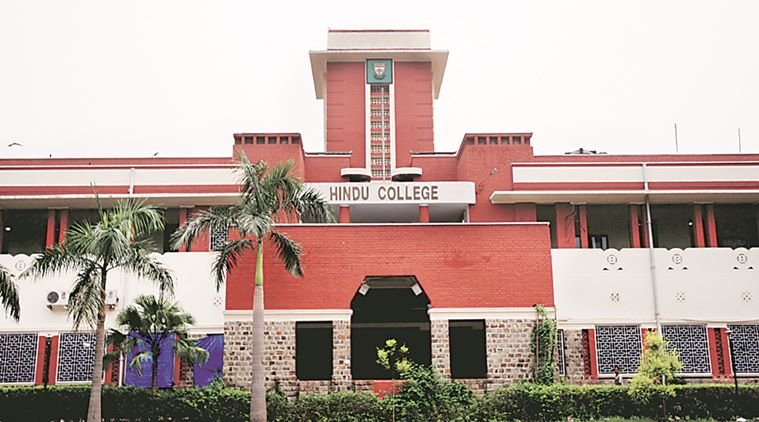On March 12, Hindu College – for the first time in its student body’s 100-year history – formally allotted office space to the leader of opposition on its campus.
With a long and rich history, pre-dating even the Indian parliament, the Hindu College Parliament is a unique student body. Established in the 1920s, it became a platform for political debate at the forefront of the freedom struggle.
Unlike other student bodies in Delhi University and beyond, which have an elected student body of four to five members, usually comprising a president, vice-president, treasurer etc., Hindu College holds elections for the post of prime minister.

Hindu College Leader of Opposition, Naveen Kumar. Credit: Facebook
The college constitution provides that the candidate with the maximum number of votes becomes the prime minister and the runner-up becomes the leader of opposition.
The elected prime minister then chooses his/her cabinet of 12 ministers and their secretaries. The ministries range from, finance, cultural, public relations, canteen to environment and library.
There is an official swearing in ceremony of the cabinet and a formal budget session to allocate student funds to different departments and societies.
LiveWire caught up with Hindu College’s leader of opposition (2018-19), Naveen Kumar, to discuss the importance of an opposition in student politics and the implications of this watershed moment.
Delhi-based Kumar is a third-year undergraduate student pursuing a B.A. in English.
How important is student politics in Hindu College?
Hindu College has always been known for nurturing top-notch politicians right from the time of India’s freedom struggle. Student politics in Hindu College has played a big role in creating several generations of politically-aware students.
Elections in the college aren’t a dirty affair, as is generally presumed of student politics. Participation rates are high and students get to learn a lot, getting to taste the experience of what real-life politics outside of college is like.
What motivated you to participate in student politics?
It was my interest in politics, and the thought that whatever flaws exist in student politics can only be mended by actively being engaged at a personal level. Moreover, I wanted to be able to do something for my college, its students, my peers and at the same time learn more about how politics actually works on the ground.
What was the status of the office of leader of opposition before you incumbency? And what has changed?
The leader of opposition, although a constitutional office, was never paid heed to – neither by the authorities nor the students.
After almost 100 years of Hindu College Parliament being in existence, it was in this session – under my incumbency – that the opposition was given a formal office space for it to function efficiently.
Although just two months of my tenure remain, I see things changing and moving rapidly in what I would call a very positive direction.
Do you think by giving a formal office space to the leader of opposition, Hindu Parliament has become more democratic?
Yes, definitely. Democracy stands for a setup in which people and their voices are given utmost importance. Without an opposition, the government goes without checks and balances and the voice of the people goes unheard.
The same is true for student bodies. With a formal space for the leader of opposition, it will be easier for the opposition to cater to the unheard voices of students, which will only lead to the betterment of the college.
Why do you think the opposition is important to student politics in India?

The new LoP office. Credit: Facebook
Opposing voices are integral to any democratic setup. Even student politics – where important issues are constantly raised and impacts are being created – having an opposition gives a platform to question the actions of student political leaders, thereby creating a healthy and robust atmosphere of debate and discussion.
Through this engagement between the government and opposition in student politics, the office that I hold can be instrumental in making student voices in the political arena stronger, refined and more influential.
What do you wish to achieve as the leader of opposition?
My objective as the leader of opposition is to become the face and voice of those students who expected an alternate government and those disenfranchised by the current one, and to not let them be disappointed in the democratic character of Hindu Parliament.
Moreover, keeping check on the government and its actions, being available to students round the clock for any help they need, to make people understand the importance of the opposition – even in student politics – and to be able to bring about substantive change in the college without being in power have been my primary objectives.
Given today’s political climate, what is your opinion on the importance of student politics and the role of the youth?
Student politics is, indeed, very important in today’s scenario.
It builds a strong foundation for an individual who aims to make a career in mainstream politics. As a student political activist, one knows how the youth thinks and what it expects from the government. For a country which is majorly populated by young people, it’s really important for us to have a socially aware and politically active youth.
Student politics serves this purpose as well; it makes young people aware of their rights and their duties in society. So, for a democratic environment to exist, student politics plays an indispensable and dynamic role.
Note: This interview has been lightly edited for clarity and readability.
Featured image source: PTI

